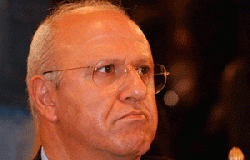BEIRUT – Hizbullah will not remain silent over the arrest of former Information Minister Michel Samaha on terrorist suspicions, Hizbullah MP Mohammad Raad said Thursday, accusing members of the judiciary of collaborating with “suspicious” security forces against the pro-Syrian ex-official.

|
| Former Lebanese government minister Michel Samaha. REUTERS |
“We have long experienced these security fabrications and some judges are connected to suspicious security services,” said Raad, in the party’s first response to the arrest of Samaha.
A pro-Syrian regime official, Samaha was arrested by the Internal Security Forces Information Branch Thursday on “suspicion of being involved in a plot to carry out terrorist attacks in Lebanon in collaboration with the Syrian regime”.
Samaha – a longtime ally of the Syrian regime, two-time minister and former MP – was taken from his summer residence in Metn’s Khanshara-Juwar Thursday morning to ISF headquarters in Beirut for questioning.
Another police unit stormed his residence in Beirut’s Ashrafieh.
The operations were carried out upon the orders of acting-State Prosecutor Samir Hammoud.
Hammoud told The Lebanese daily “Daily Star” Samaha’s case was part of a wider probe into security threats facing the country.
“There is an ongoing security investigation that has not finished yet and I am personally overseeing it,” said Hammoud, who met with Samaha later Thursday. Samaha’s personal staff, including his driver Fares Barakat, his secretary Gladys Awada and his personal bodyguard Ali Mallah, were also detained and taken in for questioning.
Security sources said Samaha admitted that he was involved in a plot to carry out bomb attacks in Lebanon and that he had personally transferred a number of explosives from Syria into Lebanon.
“Samaha admitted to personally delivering explosives from Syria to Lebanon after a number of testimonies by his driver,” one senior source said.
Meanwhile, Lebanese Prime Minister Najib Mikati said Samaha’s detention was a security-related issue and was not related to collaboration with Israel or with the Special Tribunal for Lebanon, which is probing the 2005 assassination of former Prime Minister Rafik Hariri.
After interrogations, Awada, Barakat and Mallah were later released on bail.
Security sources said an individual that Samaha was trying to hire for the alleged plot in Lebanon cooperated with the police, providing them with crucial evidence.
Cabinet’s move to provide the security forces with nationwide telecoms data last month also moved the investigation forward in recent weeks, the sources said.
According to the sources, Samaha said during his interrogation that a Syrian security official, Ali Mamlouk, had asked him to carry out attacks in north Lebanon’s Akkar, a region where the unrest in Syria has created tension.
He also said that some of the explosives had been delivered to a Lebanese man identified with the last name al-Kfouri.
Akkar MP Khaled Daher and several other Lebanese politicians supportive of the Syrian opposition had also been the targets of the plot prepared by a network of Lebanese and Syrians, including Samaha, the sources added.
Some 20 explosives were confiscated in different areas in Lebanon, according to security officials, who asked not to be identified by the media.
Samaha, aged 64, who was first elected MP in the 1992 parliamentary elections, has been an unabashed supporter of the embattled Syrian regime and President Bashar Assad.
Fearing that he might flee to Syria, members of the Information Branch raided his house in Khanshara-Juwar without an arrest warrant.
The raid took place between 7 and 8 a.m. after police blocked traffic in the area of Samaha’s residence.
“He was in his pajamas,” his wife Gladys told reporters. She also said that her husband had been arrested for political reasons.
“He was not only arrested for supporting the Syrian regime, but also because of his Lebanese political affiliation … I am hoping that his political team (March 8) will make a move,” she added.
After detaining Samaha, police also confiscated documents, a computer, video tapes, mobile phones and an unidentified number of weapons from the Khanshara-Juwar residence.
Thirty kilometers away in Beirut, a separate unit of the Information Branch stormed Samaha’s apartment on the sixth floor of the Karam Building in Ashrafieh’s Sassine Square. Members of the Information Branch surrounded the 11-story building while others searched Samaha’s apartment, confiscating documents and other personal belongings in an operation that lasted hours.
Samaha’s shocked relatives and friends anxiously waited for the police to end their search operation. Former President Emile Lahoud criticized the police raid on Samaha’s home and the way he had been detained. “These acts by the security forces violate all norms of preliminary investigations,” Lahoud said in a statement.
Lahoud also compared Thursday’s arrest to the ones that put four Lebanese generals behind bars in 2005.
Four of Lahoud’s top security chiefs were arrested in August 2005 on suspicion of being involved in Hariri’s assassination and were kept in jail until 2009.
Jamil Sayyed, one of the security chiefs who served almost four years in prison, visited Samaha’s residence in Ashrafieh and denounced the detention.
Sayyed described Samaha’s arrest as identical to his own in 2005 and criticized Hizbullah and the Amal Movement for doing nothing in response to the arrest.
Security sources from the Information Branch said that Hizbullah official Wafik Safa visited the head of the Information Branch Wissam Hasan upon the request of Hizbullah leader Sayyed Hasan Nasrallah.
“The Information Branch provided the Hizbullah official with some of the evidence used for Samaha’s arrest.”
– Reuters, TAAN, DAILY STAR






Leave a Reply